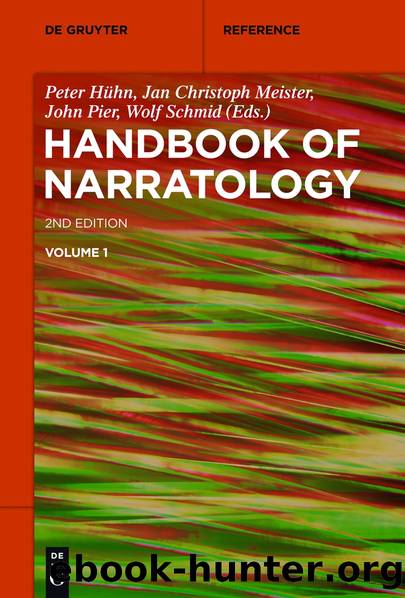Handbook of Narratology by Hühn Peter; Meister Jan Christoph; Pier John

Author:Hühn, Peter; Meister, Jan Christoph; Pier, John
Language: eng
Format: epub
Publisher: De Gruyter
Published: 2014-09-09T16:00:00+00:00
3.8 Sociology
Studies on narrative in the field of sociology (Morrison 2005) also focus on the problem of personal identity. In the sociology of knowledge (Luhmann 1989), this problem is regarded as a feature of the modern functionally differentiated society which, unlike pre-modern societies, no longer ascribes a fixed identity to its members on the basis of birth, class, etc. Identity thus becomes an accomplishment for which the individual himself is responsible. Society no longer provides an answer to the question “who am I?”, but leaves it to the individual to find his or her own answer. To do so, the modern individual must have a very clear idea of which of his behavioral traits are relevant to his participation in the various sectors of society (politics, academia, education, the economy, the arts, etc.). Nowadays, the necessity of having multi-layered identities that enable participation in various social environments is a given. Consequently, the modern individual can only resolve the problem of his (all-embracing) identity by adopting a self-image as an “individual individual,” i.e. an individual with a unique, distinctively individual life story whose decisive meaning resides in its distinctiveness from other life stories (Meuter 2002). Accordingly, the modern concept of the identity of the individual is articulated mainly through narrative. Narrative forms, with their inherent structures of temporality and meaning, indeed appear to lend themselves particularly well to questions concerning one’s own (individual) identity: it is possible in a story for one to change, develop, and integrate sudden changes (peripeteia) while somehow remaining “the same.”
The question is, though, whether and to what extent concepts of identity based on an idea of the narrative unity of human life can be upheld under the social conditions of late modern and postmodern times (Kraus 1996; cf. Salmon 2007). Critics regard such categories as continuity, consistency, and coherence, which are inherent in narrative and biographical identity, as a fundamentally totalitarian coercion into regarding one’s own life as an integral unity which must be realized. They claim that the way of life of the individual in postmodern societies can no longer be adequately described in the classical narrative sense as “I-identity,” but at best within the conceptual framework of a “patchwork-identity” (Keupp 1996).
Download
This site does not store any files on its server. We only index and link to content provided by other sites. Please contact the content providers to delete copyright contents if any and email us, we'll remove relevant links or contents immediately.
Cecilia; Or, Memoirs of an Heiress — Volume 3 by Fanny Burney(31456)
Cecilia; Or, Memoirs of an Heiress — Volume 2 by Fanny Burney(31408)
Dialogue by Robert McKee(4160)
The 101 Dalmatians by Dodie Smith(3299)
Bound by Hatred (The Singham Bloodlines Book 2) by MV Kasi(2951)
Harry Potter and the Cursed Child - Parts One and Two by John Tiffany(2921)
The Art of Dramatic Writing: Its Basis in the Creative Interpretation of Human Motives by Egri Lajos(2857)
The Beautiful Boys: A High School NA Reverse Harem Paranormal Bully Romance (Shadowlight Academy Book 1) by Gow Kailin(2729)
Angels in America by Tony Kushner(2391)
Carrie's War by Nina Bawden(2354)
A Clockwork Orange by Anthony Burgess(2321)
Unlaced by Jaci Burton & Jasmine Haynes & Joey W. Hill & Denise Rossetti(2253)
The Femme Playlist & I Cannot Lie to the Stars That Made Me by Catherine Hernandez(2170)
Drama by John Lithgow(2116)
Open Book by Jessica Simpson(2112)
Outside Woman (BWWM Amish Romance) by Stacy-Deanne(1968)
Terrorist Cop by Mordecai Dzikansky & ROBERT SLATER(1964)
Yerma by Federico García Lorca(1922)
Leo's Desire by Sundari Venkatraman(1813)
